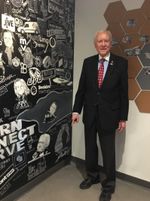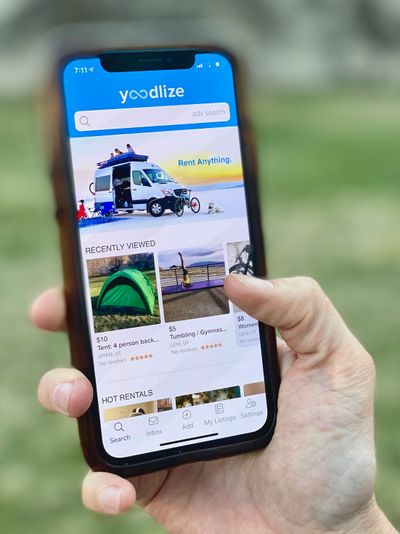Let’s imagine a scenario. Two co-founders have an idea, imagine it as software, code it to life. They work tirelessly to create their platform inside an empty apartment bedroom, the separation between home and work a mere 10 steps. After months of labor, finally — a product is born. They approach local businesses, congratulate one another on each successful sale. Catching the eye of two local venture capital firms, they hash out details of investment. High on VC money, a decision is made: it’s time to hire a master engineer. They browse the marketplace and hone in on their man, an established programmer at a respected software firm. He agrees to a meeting. He shows up to their office, expanded from spare bedroom to living room. The two co-founders wheel out a whiteboard, buy pizza, proceed to lay out their vision —if you join, here’s what the company can be. Here’s what we think awaits.
This scenario centers on one question: In the early days of company, what attracts others to their vision? What causes prospective employees to abandon better paying, more established jobs, and shack up with a startup? Why would anyone listen to a presentation from two co-founders, pizza grease on their fingers, and say, “I want to be a part of this.”
In the case of Podium, co-founded by Eric Rea and Dennis Steele, this is answered with one word: passion.
Passion defines us. We use it as fuel, an accelerant to inspire our most important choices — who to marry, where to live, what job to pursue. It drives us when all else fails, providing sense and meaning to decisions others might see as wasted. It represents a source of strength, something we can hold to at any hour and say, “This is motivation.”
Rea grew up the son of a small business owner, first a gas station, then a tire shop. He accumulated first-hand experience on the emotional gamut of running a small business and as the Internet rose to prominence, began to see the problems many faced. From this time, Rea surmised two things:
- Many small businesses don’t understand how to shift interactions from offline to online.
- Many times, the story being told online isn’t necessarily representative of a business.
In late 2013, Rea met up with fellow BYU graduate Steele and began working on a remedy for small businesses, intent on finding a way that encouraged an accurate online portrayal.
“There are millions of local businesses that don’t have a representative story about them in terms of online reviews,” said Rea. “Nobody goes to a tire shop and leaves a review about their experience, unless they had a bad experience or something incredible happened. The other 95% of customers don’t think to do it.”
![]()
Working from a spare bedroom in Rea’s Provo apartment, the two co-founders hashed out specifics on creating software that encouraged interaction between business and consumer. They built a prototype in early 2014 and began selling door-to-door, hoping small businesses would bite.
“Whatever the story being told out there is, it should be accurate,” said Rea. “We built this product making it super easy to do just that and it took off.”
Rea and Steele experienced enough early success that two Utah-based venture capital firms took note: Kickstart Seed Fund and Peak Ventures, who agreed to a $500,000 seed round with Podium in 2014. Both co-founders agreed the capital influx should be used to hire a talented engineer capable of reworking the software into a more sustainable model.
This led them to the door of Arthur Weagel, Podium’s current Head of Engineering. At the time, Weagel was working for Adobe but open to the possibilities Podium presented. He sat down in Rea’s living room, ate pizza with both co-founders, and got a taste of their vision.
In my visit to Podium’s Lehi office, Rea recounted a recent meeting he had with Weagel, where they discussed this initial meeting.
“I asked him, ‘Why did you come?’” said Rea. “Now it’s a lot easier, we have a sign on the building and everything. He said, ‘Honestly, it was the energy. It was you guys. I knew that it was going to be good and I knew that you guys would do everything you could to make it a success.’”
Again, passion.
Using a revamped product created by Weagel, Podium began slowly expanding their team — a sales person here, an engineer there, always making sure the product was priority number one.
Which leads us to another key factor in Podium’s success, the perfect complement to passion: product.
“We had to find people who were young, had a lot of potential, but not a ton of experience,” said Rea. “That was usually our perfect fit….I think that was one of the most important things we did in the early days — we always made sure we had more engineers than sales people.”
Now that I think about it, this should be their new marketing slogan: passion, product, Podium. I’ll run it by Nico Dato, VP of Marketing for Podium, and see what he thinks.
Speaking of Dato, the seventh employee hired at Podium in May 2015, he too was swooned by the passion of Podium’s co-founders. Like Weagel, he also left a more stable job, a believer in the tonic Rea and Steele were selling.
“The passion that these guys have, you can just tell from chatting with them,” said Dato. “Imagine Eric and Dennis both in their zone, pitching and selling, that convinces you. We want to prove that we can actually build something sweet, continue to bring people on that are high caliber, who want to accomplish something cool. It’s nuts, everyone here is totally on board with our mission and that’s rare. There aren’t a lot of companies you can work for where everyone is that excited to work with friends everyday, to have something you’re working towards….The software we’re building is really beneficial for consumers and businesses alike, and that makes it exciting.”
At the beginning of 2016, Podium was accepted into Y Combinator. 10 employees went to California on a three month journey that opened many useful doors, including expanded access to investors, mentors, and information.
![]()
“We all lived in a four bedroom house in Mountain View, it was crazy,” said Rea. “We spent three months there, presented at Demo Day, and it went awesome. We were the highest revenue generating company to ever come out of Y Combinator.”
At the same time, Podium raised another $3.5 million in funding that included contributions from Peak Ventures and a bunch of notable Utah-based angel investors. They began 2016 with 15 employees — by the time 2017 arrived, they had 100+.
Still, the focus remained on product.
“We’ve always considered ourselves a product company,” said Rea. “The thing we did right is we built something people wanted. That’s the motto of Y Combinator: build something people want. Even before we went to Y Combinator that was our entire focus. If we’re going to make this work, what we build has to be so valuable to these customers that they would never cancel and always get a return on investment.”
For small businesses that struggle to engage consumers online, Podium represents this value. Their platform simplifies local interaction, helping encourage customers to do simple things like leave an online review. This doesn’t sound revolutionary, but because of Podium’s execution (see: product, passion), it is.
“When we started, we knew there were probably a thousand other people working on similar ideas,” said Rea. “It’s one of those ideas you tell somebody about and it seems obvious. The idea is important, but it’s 1% of the equation. The 99% is execution.”
So far, 2017 has been a banner year for Podium. They’ve expanded to 180 employees (and counting), fresh off a $32 million Series A round from Accel, Summit Partners, GV, and Y Combinator. As Rea puts it, “We feel like we got the best group of investors for our business that we could.”
In fact, Podium has gotten so big they can even welcome broke-down, t-shirt wearing gentlemen into their office with personalized signs:
![]()
In conjunction with the raise, Podium released a customer interaction platform where businesses and customers can interact through text, email, Facebook Messenger, you name it.
“It allows businesses to have personalized interaction at scale,” said Rea. “We want businesses to be able to communicate with their customers — and vice versa — on the channels that they actually use.”
Podium operates under a mission statement that’s as relevant now as it was in 2014: powering the modern relationship between businesses and customers. The passion and dedication to product of Podium’s two co-founders is now spread across 180 employees, all intent on making the Lehi-based company something great.
And that greatness? It comes from three words: passion, product, Podium.
“We knew we had an opportunity to do something really big when we went door-to-door to these businesses, they bought it, and the product was so young,” said Rea. “What I didn’t think would ever be possible is have 180 people of such high quality, that care as much about the business as we do.”








